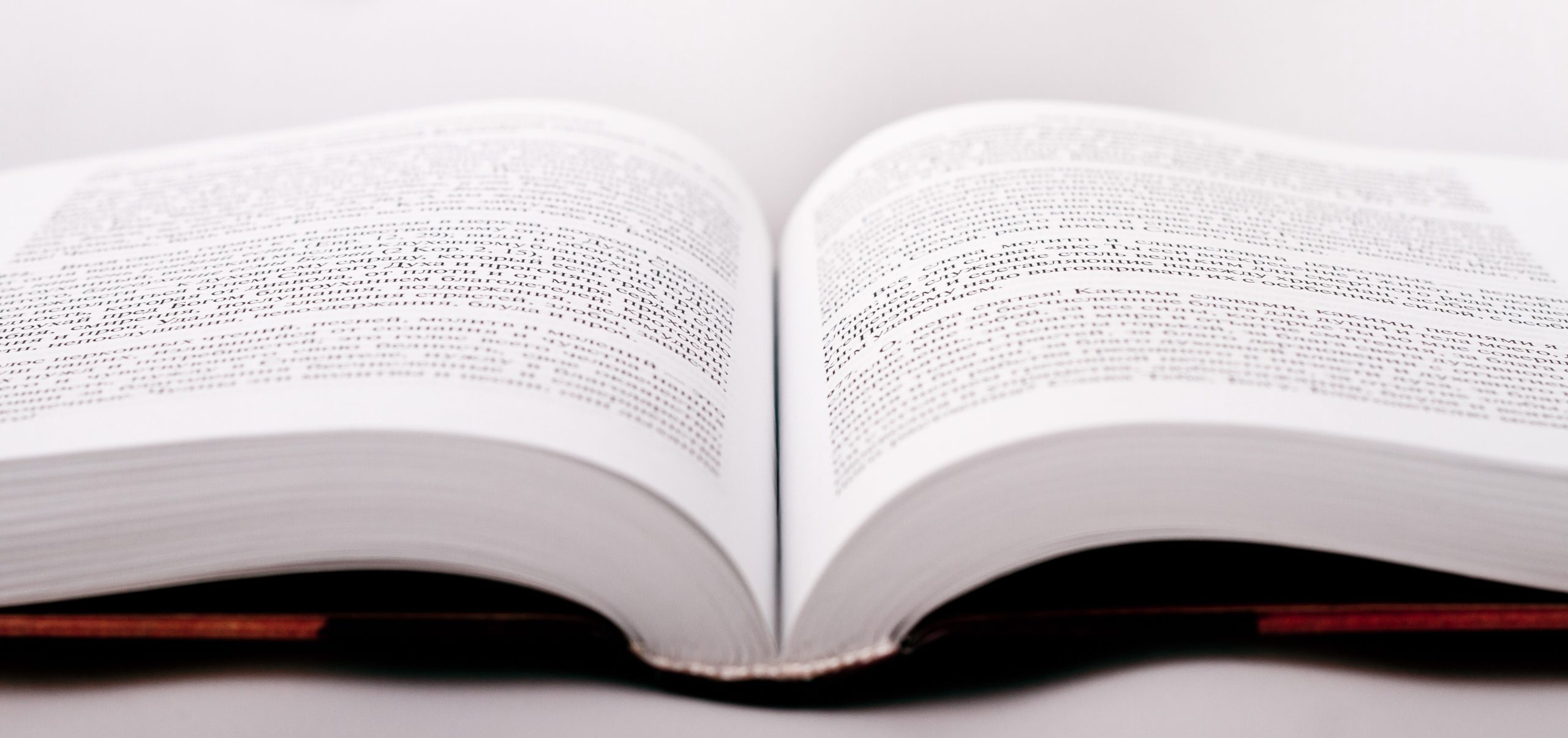Last Updated on 2022-07-08 by Joop Beris
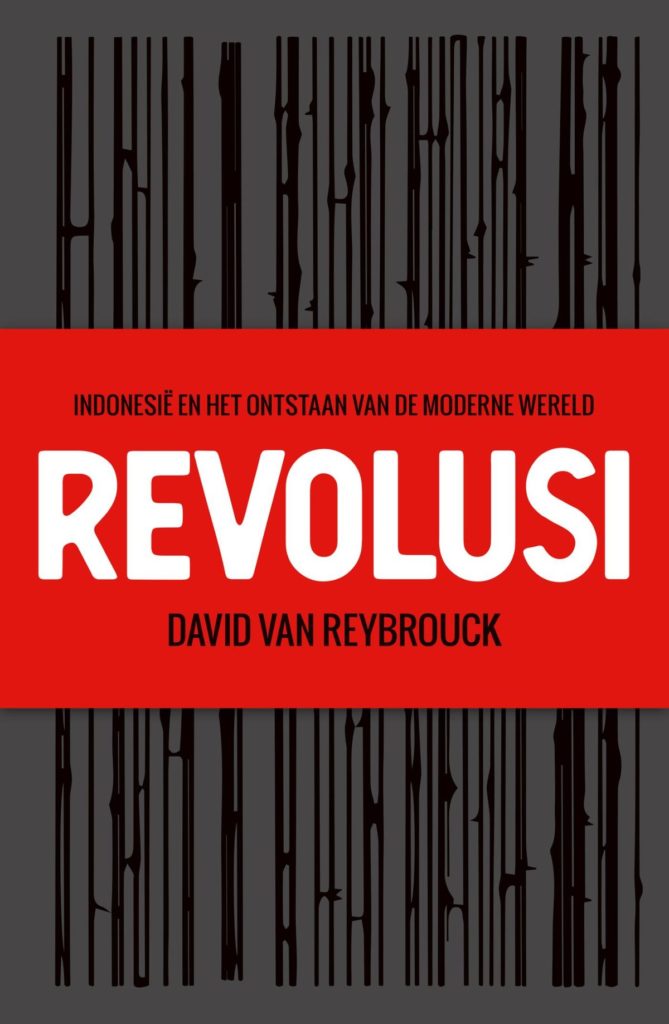
Someone recently recommended I read Revolusi, a book written by Belgian historian and writer David van Reybrouck. The title Revolusi is Indonesian for “revolution” which shouldn’t come as a surprise. In this book, van Reybrouck tells the story of how Indonesia gained independence from The Netherlands. There’s more literature on this topic but Revolusi differs from most other works because it not only talks about the events as they happened but frames them internationally. The Indonesian struggle for independence gets a whole new perspective when viewed through the lens of international politics. This review is for the Kindle version.
First impressions
Revolusi is not a small book but it is well-written and very engaging. That’s why you make rapid progress once you pick it up. It’s also difficult to put down! It’s clear that apart from being a historian, van Reybrouck knows how to keep readers entertained as well as informed. Despite the serious topic, there are humorous parts too. I laughed when the author mentions how he had to defend his choice of topic to a Dutch audience. When asked why he was writing about Indonesia, his reply was: “because it’s no longer yours”. Even better, when Dutch right-wing political party PVV complained on their Facebook page that “this idiot should write a book about Belgium and the Congo first”, van Reybrouck coolly says that he wasn’t doing that again. He already wrote a book on that! This kind of humour gave me a lot of sympathy for the author.
There are few illustrations (in the Kindle version at least) but there are maps which help illustrate the narrative. This itself is roughly chronological, starting with a brief history of humans arriving in the Indonesian archipelago all the way up to the 17th century when the Dutch arrive. From there, van Reybrouck zooms in ever closer until he gets to the period leading up to Indonesian independence.
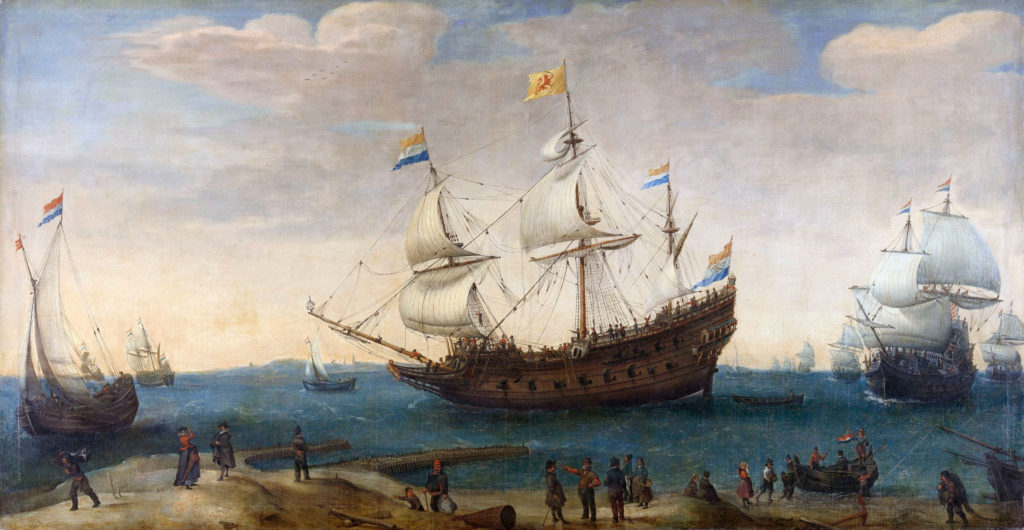
(Painting by Hendrick Cornelisz Vroom)
Oral history
When I studied to become a history teacher and learned how to do research in archives, the warning about oral history was clear. Oral history is dangerous as source material because it is so unreliable. It’s a fact that our memory is far from reliable. Combine that with the fact that most of the people interviewed are of advanced age, there is a potential for distortion and error.
Another danger of using oral history as a primary source, is that it can make your story lack perspective or become overly sentimental. Being too close to the source has the danger of letting the detail drown out the history itself.
It seems that van Reybrouck managed to avoid both of these dangers very well. The personal interviews he conducted, serve to add flesh to the bones of his overarching narrative. By interviewing people from different sides of the events, he seems to successfully avoid bias. Their stories are treated with respect but without ever becoming too sentimental. He presents them in a matter-of-fact way so that they help support his wider research and also allow the reader to feel close to often painful subjects. Used in this way, the oral history works very well within the context of the book.
It seems so familiar
The topic of Indonesia brings back fond childhood memories for me, not in the least because of the Indonesian dishes my father cooked at home. He used to work for an Indonesian toko (store) and supplied local restaurants with Asian products. Because of that, he came into contact with Indonesian cuisine and started gathering recipes to try out at home. Typical Indonesian dishes like nasi goreng, babi kecap and the famously delicious krupuk udang became a regular meal at my otherwise typically Dutch home.
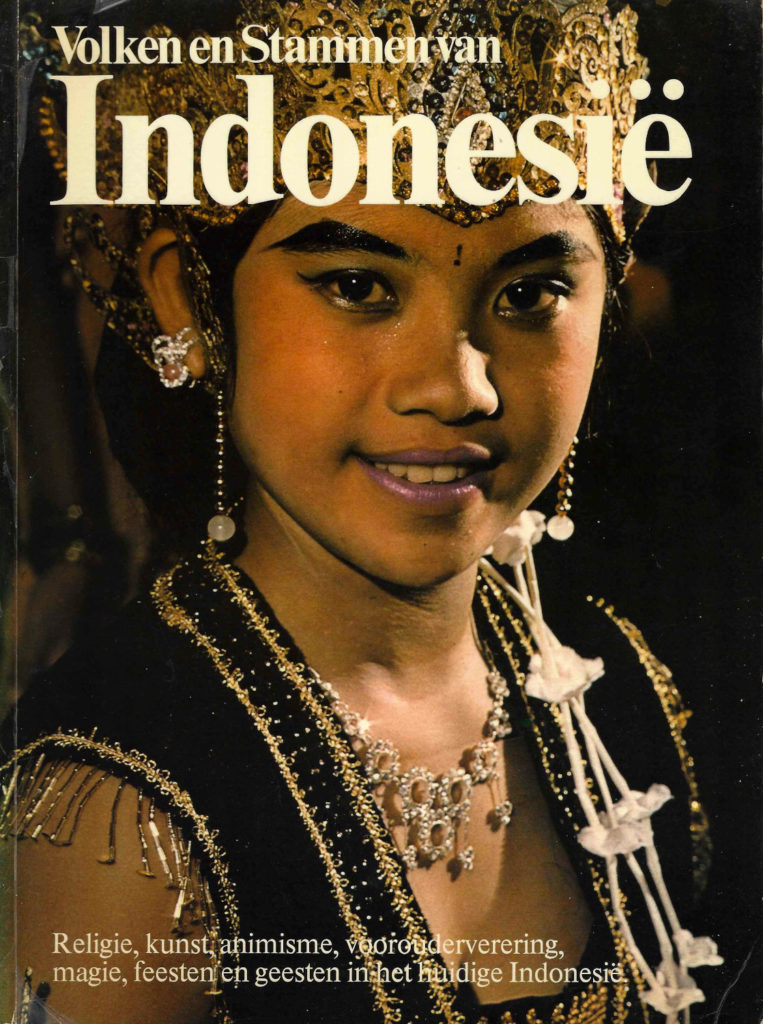
Another childhood memory is browsing the modest bookcase of my parents, which contained a small volume of books on Indonesia. My favourite was “Volken en stammen van Indonesië” (People and tribes of Indonesia). This book had many beautiful colour photos of the Indonesian landscape and the many people that live there. It all looked wonderfully exotic to my childhood eyes.
I took history in high school and even went on to study history. Of course we studied our “Golden Age“, the time from about 1588 CE until 1672 CE. It is at this time the Dutch first arrive in Indonesia and the Dutch East India Company begins to monopolize the spice trade.
So I didn’t consider myself totally ignorant on the topic of Indonesia. Because of the long colonial history between The Netherlands and Indonesia, there’s been an exchange in both directions. As a result, Indonesia doesn’t feel as foreign to many Dutch people as other places may do. It’s common to meet people with an Indonesian background and Indonesian words, shops, food and restaurants have become very much at home here. There’s also a lot of literature in The Netherlands about Indonesia and arguably the most famous book written by a Dutchman, Max Havelaar, is set in Indonesia.
I know nothing
Reading Revolusi, I realized how little I actually know about Indonesia and our shared history. This feeling is perhaps the most compelling take-away from this book for me: the feeling that I should have known more. Van Reybrouck outlines the colonial history from the time the Dutch East India Company first arrives in 1600 CE until the Japanese invasion of the Dutch East Indies in March of 1942. That’s over 300 years of history that Indonesia and The Netherlands share.
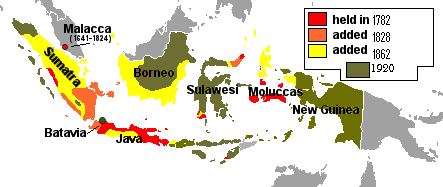
(Map by Red4tribe)
Yet, as van Reybrouck shows, Indonesia is often little more than a footnote in Dutch history. We learn in school that this is where the Dutch East India Company got the spices that made The Netherlands such a formidable trading power. It’s where we got coffee, tea, rice, sugar and rubber from. It’s the colony the Japanese took from us because they needed Indonesian oil for their war effort. It is where many Dutch people were incarcerated in prison camps run by the Japanese.
Inconvenient truth
Of course all of those things are true but they are also pretty one-sided. I’ve seen some people accuse van Reybrouck of having an anti-Dutch attitude, of being too much on the side of Indonesia. It’s easy to get that impression but perhaps a lot of that is due to the fact we simply aren’t aware of how our colonialism affected the people we colonized. Dutch historians and the Dutch government alike seem unwilling to address this. Show me one motherland that treated its colonies as more than a source of cheap raw material and labour. The word “motherland” seems far too friendly because it has associations of warmth and caring. Most often it’s a case of “tough love”.
No different
Dutch colonialism was no different from that of the British, French, Portuguese or Spanish. It had little regard for the indigenous people and their culture. It was focused on acquiring wealth and resources and when locals got in the way they were met with force, often with deadly consequences. Locals were uprooted, forced to work for their colonial masters, looked down upon and subjected to cruel and embarrassing punishments.
These things are not easy to hear. It is confronting to read about them, especially when you consider that they go back to the earliest colonial days and lasted until well into the twentieth century. Because even then, the Dutch government didn’t want to let go of its colony. It opposed Indonesian independence every step of the way until finally international pressure gave them little choice, van Reybrouck shows. How much bloodshed could have been avoided if the Dutch government had worked with Indonesian leaders like Sukarno instead of working against them? We’ll never know.
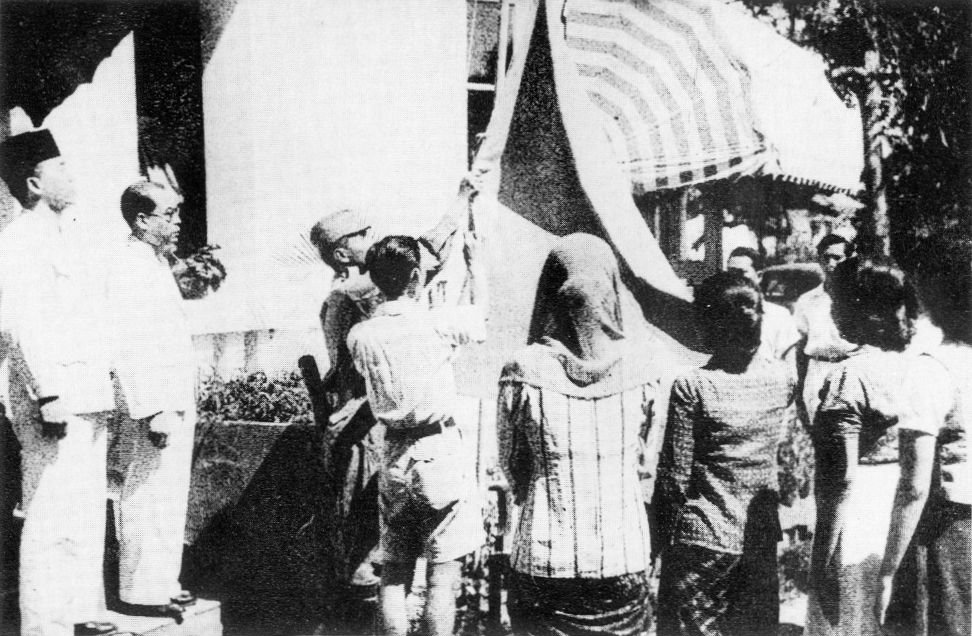
Bandung spirit
In 1955 a now independent Indonesia organised the Bandung Conference, together with India. According to van Reybrouck, this was one of those key events in history similar to the French Revolution or the fall of the Berlin Wall. The participants were 29 newly independent countries which asserted themselves as a new, non-aligned power-block in the world. No Western countries attended nor were they invited. It was the first time in history something like this happened and it gave this “coalition of the downtrodden” a new elan.
Van Reybrouck claims that the “Bandung spirit” inspired people like president Nasser of Egypt but also Martin Luther King Jr., Che Guevara and Malcolm X. In this way, Indonesian independence had a direct influence on the civil rights movement in the US. Its influence was so alarming to the US government that in the 1960’s the CIA resorted to assassination and even toppling of entire regimes thusly inspired. That’s certainly very interesting but unfortunately this part of Revolusi feels the most like speculation to me. I need to look into this further before I can endorse this.
Still, it makes you wonder what the world might have looked like if the Bandung spirit had endured.
Conclusion
Revolusi left me with a feeling of sadness and not just because I finished reading it. It is a powerful indictment of Dutch colonialism and our attitude towards that troubled past. Perhaps it is very telling that most Dutch people can tell you what krupuk is but have no idea what merdeka (independence) means. The loss of life and the amount of human suffering in the archipelago during the Second World War and the following struggle for independence is simply staggering. At the same time, it is inspiring to see how Indonesia could rise above all that. How, despite all the hardship, the desire for freedom and self-determination prevailed.
Is the Indonesian independence really the catalyst that triggered an awakening of former colonial nations and the American civil right movement? I’m not entirely convinced but it’s a compelling and romantic idea.
Revolusi is a must read if you are interested in the history of Dutch colonialism. It is also a must read if you have an interest in Indonesia. I hope that this book and the accompanying TV series (which I have not yet seen) will serve to inform people of the dark side of Dutch colonial history. It’s impossible to go back and change what happened. But that doesn’t excuse us from the responsibility to remember and to accept our role in the events.
More reviews
This review is reproduced in part on Amazon. See my other reviews!

